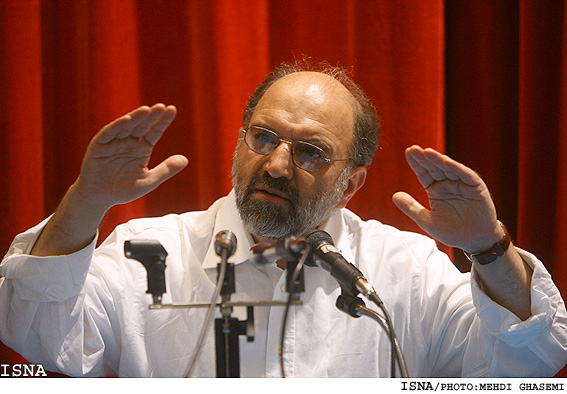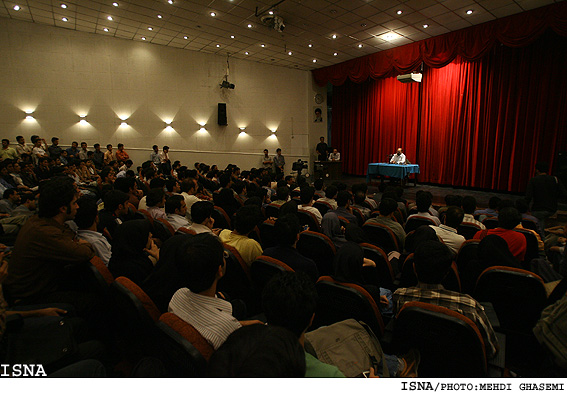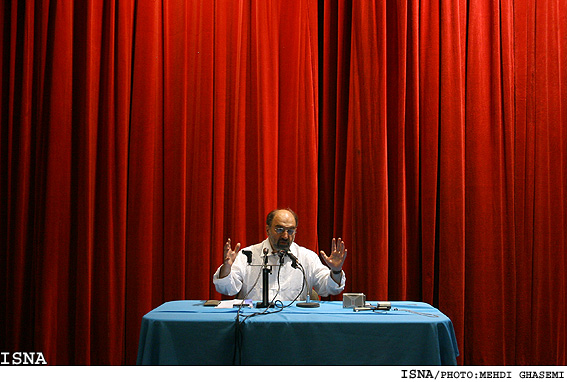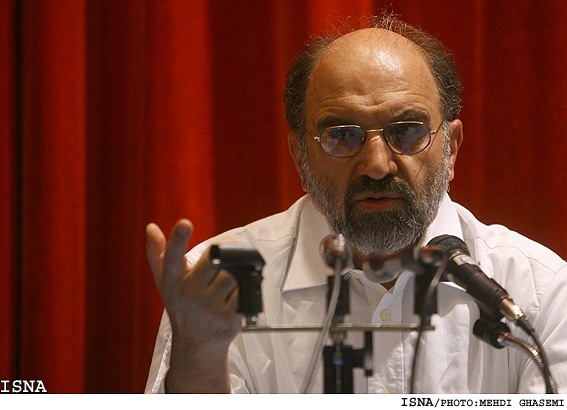|
Addressing a students gathering organized by Sharif University’s
students union, Abdulkarim Soroush said: ‘The Koran brings you the
message of fear; Mowlana Jalal-al-Din Rumi brings you the message of
love; and I bring you the message of courage, in the sense that you
should have the courage to do away with superstitions and things that
aren’t right, because you won’t become learned by pure imitation.’
When a student asked, ‘Why don’t you invite officials to feel fear and
the people to feel courage?’ Dr Soroush replied: ‘I invite you to feel
fear before God. Besides, they don’t listen to us very much. But
whatever rank they hold, we hope that they’ll open a space and an
opportunity for the people, and at least allow the people to encourage
virtue and discourage vice, and to point out to them where the
injustices have occurred.’
Dr Soroush said: ‘The flow of preaching from on high to down below
creates a fatal deadlock in our society. We hope that this deadlock will
be removed with prescience and that they’ll wholeheartedly devote
themselves to serving the people and listening to their criticisms,
because, if the people’s right to criticize rulers is recognized and its
religious importance noted, it will set in train an auspicious movement
that will rid us of social ills.’
Dr Soroush added: ‘Unfortunately, many people suffer from the delusion
of repletion and imagine they have no need of our words, whereas this is
exactly what has created the barriers between us. Of course, we’ve
always said that some of our rulers have faults and we’ve paid the price
for this. And we have to recognize that we, too, have faults and we must
be exigent with ourselves; we mustn’t blame others whilst exonerating
ourselves.’
Dr Soroush, who was speaking on the subject of ‘Koranic Fear’, said: ‘I
believe that the Koran can be called the book of fear because there is
much evidence to show that fear is one of God’s central teachings to
Muslims. Fear is a frequently recurring theme in the Koran and prophets
are depicted as bearers of both warnings and glad tidings, in the sense
that those who benefit from the warnings are worthy of the glad tidings.
First the warnings arrive and have their impact. Then, the fear-ridden
audience becomes deserving of glad tidings and you experience a total
revolution within your being.’
Dr Soroush said: ‘Our mystics discovered a new point in Islamic culture:
that the relationship between human beings and God is one of fear and
love. Fear is the most important lesson that the Koran teaches. It
prepares you to face God in a particular way. It is through this same
fear that human beings can heal themselves.’
Dr Soroush said: ‘Fear is a fright that is combined with shame and it
can be called a kind of loving defeat. Fear is a state of being whereby
you feel reduced to nothing before God’s grandeur. Self-knowledge is
achieved to the utmost degree; you recognize the fundamental limits of
your being and sense that you are a segment of God’s grandeur.’
Dr Soroush also said: ‘The gist of my message is that sorrow and fear
are depicted in the most effective way in the Koran. Of course, mystics
found that there was another key to conquering the peaks which was the
key of love. And, as the inheritors of both these things, we must value
both fear and love.’
Responding to a student’s question, Dr Soroush said: ‘No sect within
Islam is opposed to the fear within Islam; the differences arise over
loving God.’
Dr Soroush also said: ‘The truth of religion is that we must prepare
ourselves for encountering the limitless. Whether the encounter is
rational or mystical, this is the task of believers: a fateful
encounter, although the bulk of the people can’t bear to encounter the
limitless.’
Explaining the notion of fear, Dr Soroush said: ‘Invite the limitless
into your being, like a shadow that wants to embrace the light; the
result is the destruction of the shadow. Don’t let them prevent you from
moving towards the limitless be it in the name of irreligion or
religion.’
Responding to a question from a student who described fear as a bitter
truth, Dr Soroush said: ‘My main aim is to explain that fear is not
because God is frightening but because of the lover’s surrender and
submission to the Beloved, and the future belongs to love. Fear means
that I, the limited creature, feel that I’m limitless.’
Dr Soroush also said: ‘Atheistic existentialists don’t approve of the
encounter between the limitless and the limited and they say that this
leads to the destruction of the limited. For this one moral reason, they
believe that God must be abandoned because belief makes human beings
humble and servile and servility is a reprehensible thing.’
In response to another question, Dr Soroush said: ‘The Koran is an
exceptional, different and amazing book; a civilization-founding book,
which has created this great civilization.’
Another student asked whether mystical sorrow was the same as a lover’s
joy. Dr Soroush replied: ‘Some people experience mystical sorrow and
others experience a lover’s joy; fortunate are those in whom this sorrow
and joy is combined.’
Dr Soroush also said: ‘There are two ways of arriving at fear; one is to
focus on the vices and virtues like Al-Ghazzali did and to drive away
the vices and implant the virtues in your heart. The other is to do what
Rumi did and to spend time with and become the companion of someone who
has these characteristics.’
 
 
|




